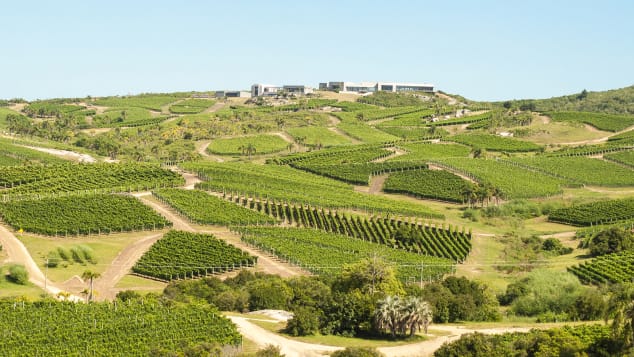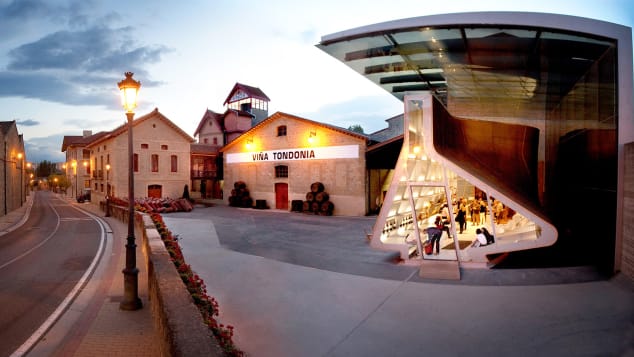The world’s best vineyards for 2019 revealed
Forget crumbling chateaux in the French countryside. For the ultimate vineyard vacation, try a Bond villain-style lair in the majestic mountains and valleys of South America.
Wine experts, foodies and travel industry insiders from around the world gathered in London’s Banqueting House on Monday night for the inaugural World’s Best Vineyard Awards, created to honor the finest in modern wine tourism.
The 2019 winner is an Argentinian winery in the lush heart of the Uco Valley, at the foot of the Andes mountains. A family-run business founded in 1963, the Zuccardi Valle de Uco unveiled a stunning new modernist bodega in 2016, designed by architects Tom Hughes, Fernando Raganato and Eugenia Mora.
“We are three generations involved in the wine and working together,” said managing director José Alberto Zuccardi when accepting the award under the frescoed ceiling of the 17th-century Banqueting House. “It’s a great way to be in contact with the wine lovers.”
Total package
1,500 wineries around the world were nominated for the awards, with around 3,500 votes cast by an international academy of wine tourism experts.
“Wine is a reflection of its individual surroundings, its terroir,” said the awards founder Andrew Reed. “It’s not just about the wine; it’s a total package.”
South America dominated the top 10, with awards going to two wineries from Argentina, two from Chile and one from Uruguay. Chile was the biggest winner of the night, with eight vineyards placing in the top 50.
The traditional wine regions of France and Italy put in a less impressive performance. The highest-place French vineyard was Château Smith Haut Lafitte, near Bordeaux, at No.16, although the country made up for this with seven placements in the list overall.
Italy’s best vineyard was Antinori nel Chianti Classico in Tuscany, placed 18th. Its new cellar, opened 2012, is a glorious brick-red structure of terracotta and wood, which, said awards host Nigel Barden, “has more of the feel of a place of worship than a place for storing wine.”
Grapes, views and gourmet experiences

Bodega Garzon is in Uruguay’s coastal region of Maldonado.
Courtesy Bodega Garzon/World’s Best Vineyards
Uruguay’s Bodega Garzón, in second place, was praised as a leader in sustainability. As with the other stars on the list, it offers a top-class program of tastings and events, and its 120-seat restaurant offers Uruguayan cuisine and panoramic views of the surrounding countryside.
Spain’s López de Heredia Viña Tondonia — a Rioja winery run by the López de Heredia family for close to 150 years — took the prize for third place and was named Best in Europe.
New Zealand’s Rippon, a biodynamic vineyard on the shores of Lake Wanaka, was in eighth place and named Best Vineyard in Australasia.
North America’s highest entry was Robert Mondavi Winery in Napa Valley. It produces world-class Cabernet Sauvignon Reserve and Oakville District Cabernet Sauvignon but, said Barden, “it’s not just the winery, the food is supreme.”
Cape Town’s Vergelegen Wine Estate, with its pristine gardens, excellent cuisine and 300-year history, was No. 34 on the list and named Best in Africa.
Lebanon’s emerging wine scene was represented by Chateau Heritage (No.49), which was named Best in Middle East and Asia.
There were 17 countries represented in the top 50, with representatives from the UK — Ridgeview, at No. 36 — and Canada — Mission Hill Winery, at No. 50 — sitting proudly amongst classic wine-producing destinations.
Frank Gehry and Zaha Hadid
Spain’s Marques de Riscal winery (No. 9), with its eye-popping design by legendary architect Frank Gehry, was typical of the new breed of vineyard where top-class architecture is on the menu alongside the traditional varietals and gourmet food offering.
South Australia’s d’Arenberg Cube (No .29), whose five levels include a wine sensory room, a virtual fermenter and an Alterante Realities Museum, is an ultramodern experience deep in the McLaren Vale region.
Chile’s Clos Apalta (No. 6), designed by Roberto Benavente Riquelme and Amercanda Office, is a six-level structure of wood, glass and steel — complete with wine library, while Argentina’s Catena Zapata (No. 5) boasts a pyramid-like design inspired by Mayan architecture.
The late British-Iraqi architect Zaha Hadid, famous for her work on everything from the San Francisco Museum of Art to Baku’s Heydar Aliyev Center, created a pavilion for the 125th anniversary of Spain’s R. López de Heredia Viña Tondonia winery.
It’s yet another example of the finest vineyards’ fusion of tradition and terroir with 21st-century innovation and progress

Zaha Hadid was behind this 2012 pavilion for R. López de Heredia Viña Tondonia.
Courtesy R. López de Heredia Viña Tondonia/World’s Best Vineyards
The world’s best vineyards
1. Zuccardi Valle de Uco (Argentina) *Best in South America*
2. Bodega Garzón (Uruguay)
3. R. López de Heredia Viña Tondonia, S.A. (Spain) *Best in Europe*
4. Quinta do Crasto (Portugal)
5. Catena Zapata (Argentina)
=6. Montes (Chile)
=6. Clos Apalta Winery (Chile)
8. Rippon (New Zealand) *Best in Australasia*
9. Marqués de Riscal (Spain)
10. Weingut Dr. Loosen (Germany)
11. Craggy Range (New Zealand)
12. Robert Mondavi Winery (California) *Best in North America*
13. Penfolds Magill Estate (Australia)
14. Viña VIK (Chile)
15. Weingut Tement (Austria)
16. Château Smith Haut Lafitte (France)
17. Viña Errázuriz (Chile)
18. Antinori nel Chianti Classico (Italy)
=19. Opus One Winery (California)
=19. Domäne Wachau eGen (Austria)
https://edition.cnn.com/travel/article/world-best-vineyards-2019/index.html















